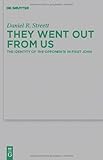 One of the most difficult parts of trying to speak Koine Greek is finding the right ancient word. I’ve already detailed a lot of the problems with most of the currently available resources in this post on the need for a contemporary English to Greek Dictionary. In that post, I mentioned The Perseus Project’s search function at http://www.perseus.tufts.edu/hopper/definitionlookup as a quick way to find what you need, but I pointed out how unhelpful many of its features were.
One of the most difficult parts of trying to speak Koine Greek is finding the right ancient word. I’ve already detailed a lot of the problems with most of the currently available resources in this post on the need for a contemporary English to Greek Dictionary. In that post, I mentioned The Perseus Project’s search function at http://www.perseus.tufts.edu/hopper/definitionlookup as a quick way to find what you need, but I pointed out how unhelpful many of its features were.
 Well, recently Don Cobb directed me to a much better version of the same type of search. Check out http://perseus.uchicago.edu/Reference/LSJ.html Now, I realize I’m probably the last person on the planet to find out about this, but better late than never, right? In any case, here’s what’s so much better about this page:
Well, recently Don Cobb directed me to a much better version of the same type of search. Check out http://perseus.uchicago.edu/Reference/LSJ.html Now, I realize I’m probably the last person on the planet to find out about this, but better late than never, right? In any case, here’s what’s so much better about this page:
- You can perform a full text search on the entire unabridged 1940 Liddell Scott (LSJ). For some reason it works better than the other search. E.g., the old engine could not find κερασιον by searching for ‘cherry,’ the new one presents κερασιον as the first result. Another example: search for ‘Chinese.’ The old one finds nothing, while the new one finds Σηρ, ‘China,’ from which we can use σηρικος for the adjective, Chinese.
- You can do proximity searching, or include similar words.
- The output page is much cleaner and more pleasant, plus you don’t have to click through to see the basic dictionary entry.
- If you do click through, you can get a very clean representation of the content of the entire page from LSJ–any of the text can easily be copied and pasted into other documents (it’s all unicode).
- You can do phrase searches!
Enjoy! I’ve updated my Resources Page to reflect this.





Several more points about the UChicago implementation:
1) You can search for words ending or starting with any given pattern
2) After you retrieve a search, and then click on a lemma entry, you can click on the title of the LSJ lexicon at the top and retrieve an alphabetical list –sometimes you want to find all similar words and a list can help sometimes